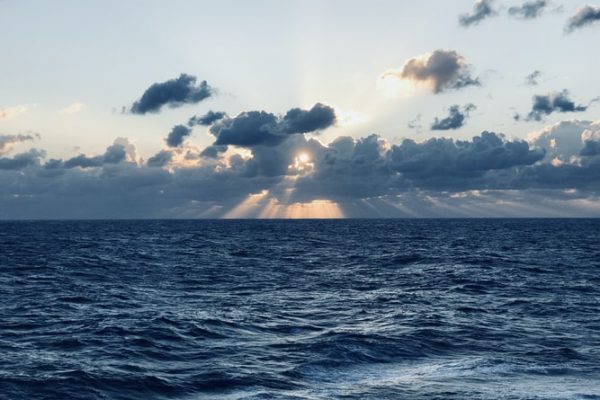I remember something my sister said when we were kids that has stuck with me ever since. We were playing in the living room one day, sitting in a patch of sunlight that haloed us against the window, when she looked up and remarked “I think heaven would be really boring, to be honest.”
I laughed at her then, but I secretly agreed. Yes, the idea of a monotonous, cookie-cutter Utopia does sound boring. I wondered about this for years. How can beings such as humans not be bored if we have no work, no challenges, no accomplishments? What is there to do in Heaven? Could perfection really be a good thing? If you play a game of golf, will you hit a hole in one every time? If you cultivate a garden, will it always give forth a profusion of lush plants regardless of how much or how little care you put into it? What would it mean to be an individual in Heaven? Would we all be the same perfect form, exactly alike in our flawlessness?
It’s not hard to imagine how such an existence would rapidly become a monotony. Humans need obstacles to surmount, deeds to accomplish, new experiences to be had to make their life worthwhile. That’s not to say that there must be evil for life to have value. A world where pain and suffering exists is hellish. But a world where there are no challenges or difficulties at all – no change of any kind – would be sterile, pointless. It is mentioned in various narrations that we’d still have our memories of this world in the afterlife. Wouldn’t retelling our stories of this brief dream called life get old after the hundredth billionth time? What would happen after Judgment Day, when all of humanity is either in Heaven or Hell and everything that’s ever going to happen will have happened? Is it possible to live in a changeless eternity and never tire of it? For all its nightmares, all its sadness and horror, life on Earth has a point: while we are here, we can do things, things that matter; we can make a difference. Things change; develop. Nothing is guaranteed.
These thoughts were always present in the back of my mind, but I never really gave them much attention until now. I recently discovered that the more I learn about the Islamic view of heaven, the less doubts I have. The human intellect, as remarkable as it is, has its limitations. When something is beyond humans’ scope of comprehension, it can’t be explained in our language. This idea of a monotonous heaven is only our understanding of it. The real thing is so much more complex and layered subhan’Allah.
Part of our problem is that, when we form an image of what paradise is like, we naturally draw on our experience as physical beings, in this world of time and space. If you imagine yourself sitting in paradise, you are still your human self, with its limited perception and other capacities. However, the spiritual state is different. As Rumi said:
“The body did not exist and I was a spirit with You in heaven, Without composition and one in substance, we were all on yonder side, headless and footless. Like the sun we were one substance, like water we were pure and without ripples. When that pure light entered into form, multiplicity appeared like the shadow of a battlement.”
In fact, we are unable to conceive what the experience of paradise is like:
The Messenger of Allah (pbuh) said: “Allah said: ‘I have prepared for My righteous servants what no eye has seen and no ear has heard, nor has it occurred to the human heart.'”
(Hadith Qudsi 37)
“And no soul knows what joy for them [the inhabitants of Paradise] has been kept hidden” (Qur’an Chapter 32 Verse 17)
“Nor is paradise a place to enjoy the blessings only of one’s previous good deeds, but it is the starting point of the development of the faculties of man. Those in paradise shall not be left idle, but they shall be continually exerting themselves to reach the higher stages. It is for this reason that they are taught to pray, even there, to their Lord: “O our Lord! Make perfect for us our light”. 66:8
This unceasing desire for perfection shows clearly that progress in paradise shall be endless. For when they have attained one excellence they shall see a higher stage of excellence. This ceaseless desire for perfection shows that they shall be endlessly attaining to excellences.” – Ikbal Ali Shah.
Another Hadith comes to mind, which implies how there is such a thing as improvement in the afterlife:
The Messenger of Allah, may Allah’s peace and blessing be upon him, said, “In Jannah there is a market to which the people will come every Friday. The northern wind will blow and shower fragrance on their faces and clothes and, consequently, it will enhance their beauty and loveliness. They will then return to their wives who will also have increased in their beauty and loveliness, and their families will say to them: ‘We swear by Allah that you have been increased in beauty and loveliness since leaving us.’ Thereupon they will reply: ‘We swear by Allah that you have also been increased in beauty and loveliness since we left you.” [Muslim]
The thing about heaven is that you can have anything you like: it caters for all tastes, after all. So if you want a heaven in which you experience the bittersweetness of longing, like after departing from someone and missing them briefly before your next visit, you will be able to do so. Heaven is yours to imagine, within creational and rational limits, of course. That is why heaven is so amazing, so wonderful. Doing exactly what you want, and being exactly how you wish to be, does not detract from the universality of the heavenly experience. There is a general paradise, which everyone experiences, and there are individual paradises, which reflect every individual’s unique personal state. Imagine a group of people at the movie theatre. Each person enjoys and appreciates the film in his or her own way, in accordance with his or her unique capabilities and understanding. They are all watching the same film but perceiving and understanding it in their own ways.
Also consider this: our idea of eternity doesn’t match reality. We see it as linear; something to be measured. But time in heaven isn’t like time on Earth. Iblees was said to have prostrated to Allah (swt) for 10,000 years each prostration. Boredom, impatience, etc, are negative human earthly emotions that will stay behind, so even feeling discontent at being constantly content might be impossible. Doing the same thing for eternity doesn’t mean we’d have the same experiences every time.
How could there be boredom in heaven when it has an infinite number of modalities of being? There will be progress from one state to another, if one wishes. There will be an awareness of “other-than-heaven,” partly through memory and partly through familiarity with the pains of hell, which most of us will have experienced. When you take into account the fact that Allah is the Source of infinite possibilities, then to think in terms of “getting bored” is meaningless. It is precisely because we are not living in a heavenly state that we think in binary terms – ups and downs, pleasure and pain, positive and negative, black and white, and so on. Some books and movies depict a “Utopia” in this manner (such as The Giver), and while it is true that in this life we require pain to grow in wisdom, we should not presume that existing in a state of paradise wanes, becomes dull, or is lacking. To suggest so would be to speculate and not speak from experience, which is ironically the very thing we seek to understand while discussing what is heaven like. The binary world will give way to a realm of absolute Being, in which all binaries and contradictions are resolved. The Divine Presence is bliss. And pleasure as a manifestation of Divine Pleasure does not need a worldly cause.
Lastly, remember this: one is perfect relative to the previous stage, but imperfect (in a state of loss) relative to the next stage. Imam Ali Ibn Abi Talib (as) once said “People are asleep as long as they are alive; when they die, they awaken.”
Speaking metaphorically, we all died once already, at birth. We were living in another world which was the womb, and to be able to live in this world, we died in that world, though from this world’s perspective we see it as birth. This life compared to the hereafter is like living in the darkness of the womb. In order to be born, we must die first.
I begin and conclude with these two words, which have been present in every syllable: Allahu a’lem. Surely, undoubtedly, Allah knows best. It should be noted that we should try to pray for heaven solely to feel nearness to our Lord, out of love for Him. Any details afterwards can be dealt with when the time comes, if Allah (swt) grants us such a reward. Nevertheless, we should keep researching and wondering. After all, one of the many wonderful things about Islam is that it invites us to ask questions that are usually overlooked. May the Most Merciful grant us all Paradise as our ultimate resting place.
“And verily, the Hereafter will be greater in degrees and greater in preference.” 17:21





